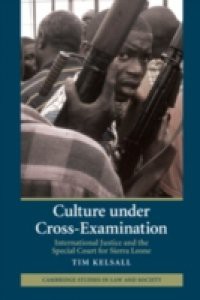The international community created the Special Court for Sierra Leone to prosecute those who bore the greatest responsibility for crimes committed during the country's devastating civil war. In this book Tim Kelsall examines some of the challenges posed by the fact that the Court operated in a largely unfamiliar culture, in which the way local people thought about rights, agency and truth-telling sometimes differed radically from the way international lawyers think about these things. By applying an anthro-political perspective to the trials, he unveils a variety of ethical, epistemological, jurisprudential and procedural problems, arguing that although touted as a promising hybrid, the Court failed in crucial ways to adapt to the local culture concerned. Culture matters, and international justice requires a more dialogical, multicultural approach.

